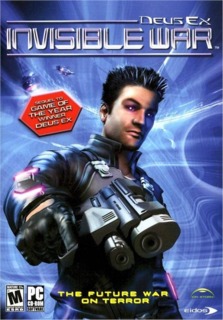Compared to its predecessor, Invisible War is a rather average experience, which feels like a step back for the series.
Let me begin with the story. On its own, it is a perfectly solid and gripping narrative with the usual few twists and turns and the same mega-conspiracies hell-bent on world domination, along with the same well meaning individuals wanting to forge a better society. Set 20 years after the events of Deus Ex, the world has partially recovered from The Collapse, one of the possible endings of the original game where the global communications network was disabled, throwing much of the world into chaos. J.C. Denton has also merged with the Helios AI (another ending from the original) but has not been seen since. You play as Alex D, a man/woman (it is your choice as to which) trainee at the Tarsus Academy, which is kind of like an elite prep school for the development of a new era of bio-modified individuals. During the introduction, a nanite-infused bomb destroys the entire city of Chicago, leading you to relocate to Seattle. Most of the story involves juggling your alliances between various groups such as the WTO (never specifically called the World Trade Organisation, but this is taken as red), the Knights Templar and the mysterious ApostleCorp, attempting to figure out which is the best course of action to take and gradually unravelling the truth behind the mystery, behind the lies. As before, any action taken will have a knock-on effect with your dealings with the various organisations, and will eventually affect the overall outcome of the game.
Invisible War tries to tread the rather rickety path of moral ambiguity to a greater degree than its predecessor. No specific group in the game can be fully designated as 'the bad guys' or 'the good guys', since these alliances will waiver and alter depending on your choices and actions taken. Should I follow authority, my head or my heart? Whilst this lack of a basic morality spectrum is very interesting philosophically speaking, it can leave the player feeling slightly disorientated and constantly unsure which path to take. However, in terms of the game's plot trying to make use of player free will, this makes perfect sense, and does lead to an interesting finale. Character voices also make a marked improvement, with people actually displaying emotions such as fear and anger, and even the occasional humorous exchange.
Now we must come to the points which mark the slight collapse of the game, firstly the environments. Everyone should remember that in Deus Ex, maps were either pretty spacious or well designed, such as the entire exterior of Liberty Island (including the Statue of Liberty). Loading screens were also extremely brief, taking a maximum of five seconds to translate almost seamlessly from one locale to another, and normally in relative continuity. Sadly Invisible War does not follow this setup. All of the environments here are small and normally rather uncluttered of objects, each requiring a physical door to be opened in order to move to a new location. There is also a lengthy loading screen for each transition, which basically features a complete removal from the gaming experience every time. Graphically, the environments and characters are far superior to the original, with some good physics and mainly realistic facial expressions and lip syncing.
Secondly, the main character of Alex D is a more or less 2-dimensional creation. J.C. Denton had some kind of (albeit minimal) characterisation in the original, but Alex is a blank canvas who is basically a pawn for those who control him. You can make him either the zenith of evil, or a saintly saviour, given your fancy. Again, whilst this is supposed to create an atmosphere where you feel as if you actually are Alex D, it doesn't manage to accurately convey that feeling. Further, the inventory system has simplified far too much. All the way through the game, there is a strange, semi bio-optical overlay which somewhat impairs your field of vision. Your primary items are displayed on this overlay, and you can go into your inventory to access the secondary ones. Another weird idea is that of universal ammunition. Every weapon in the game uses the same plasma type of ammunition, from pistols to rocket launchers. Apart from being highly unrealistic, the universal ammunition also depletes itself at different rates, depending on what weapon you are using. This equally makes no sense whatsoever.
In conclusion, all of these niggling little points simply combine to create a mediocre game. Invisible War is a victim of its predecessor's success. It's just too clunky, stripped down and lacklustre to exhibit any of the amazing atmosphere, tension and mainly style that the original Deus Ex had, and that game managed to do it with graphics that looked half as good as those of Invisible War. Let's hope that the now confirmed Deus Ex 3 returns solidly to the grassroots, and more or less forgets about this poor sequel.

